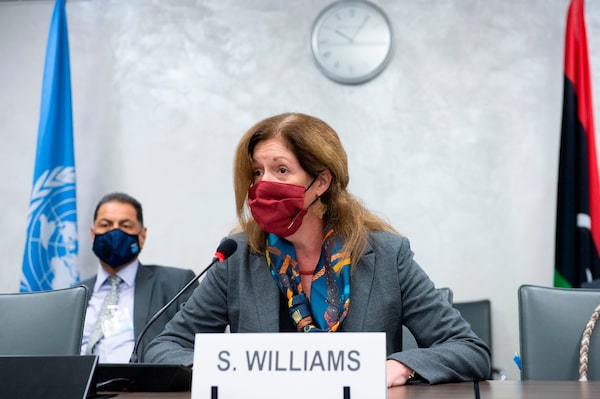
This handout picture distributed by the United Nations Office at Geneva shows Stephanie Williams, deputy special representative of the UN secretary-general for political affairs in Libya, during talks in Geneva, on Oct. 19, 2020.VIOLAINE MARTIN/AFP/Getty Images
Military leaders from Libya’s warring sides met Monday in Geneva in hopes of a UN-brokered breakthrough that could pave the way for a “complete and permanent ceasefire” in the conflict-ridden North African country.
The meeting that began Monday marks the fourth round of talks involving the Joint Military Commission under the watch of the head of the United Nations support mission for Libya, former U.S. State Department official Stephanie Williams.
UN organizers say the round is expected to run through Saturday, and Williams' mission “hopes that the two delegations will reach a solution to all outstanding issues in order to achieve a complete and permanent ceasefire across Libya.”
The meetings make up the security aspect of three-track talks, also involving political and economic tracks, that are aimed to lift Libya out of its gruelling conflict that has ground on nearly ever since the fall of Moammar Gadhafi in 2011.
Speaking at the start of the talks, Williams told the two sides that their success in these talks would have a positive effect on the political and economic tracks of the ongoing UN-brokered talks aiming at ending years-long Libya conflict.
Williams, who met on Friday with Russian Foreign Minister Sergey Lavrov in Moscow, said encouraging separate meetings were held with the two delegations in the past two days.
The Geneva-based military talks came ahead of an upcoming political forum in Tunisia in November. That forum aims to “generate consensus on a unified governance framework and arrangements that will lead to the holding of national elections,” the UN mission said.
Last month, the two sides reached preliminary agreements to exchange prisoners and open up air and land transit across the country’s divided territory. This breakthrough also accompanied with the resumption of oil production after months-long blockade by powerful tribes allied with army commander Khalifa Hifter.
Hifter’s forces launched an offensive in April 2019 to try and capture Tripoli, the seat of the UN-supported government in the west. But his campaign collapsed in June.
Fighting has since died down amid international pressure on both sides to avert an attack on the strategic city of Sirte, the gateway to Libya’s major oil export terminals.
Our Morning Update and Evening Update newsletters are written by Globe editors, giving you a concise summary of the day’s most important headlines. Sign up today.